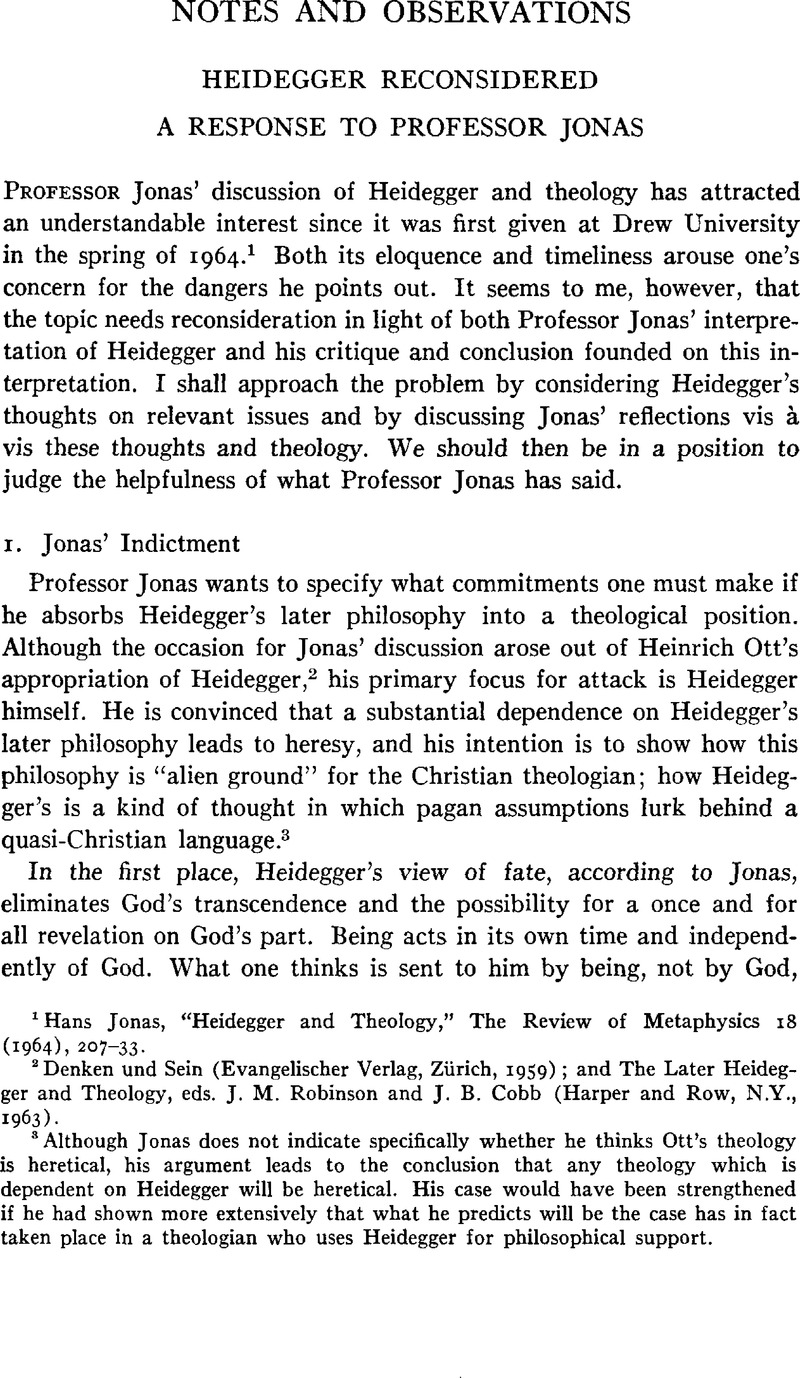Article contents
Heidegger Reconsidered: A Response to Professor Jonas
Published online by Cambridge University Press: 10 June 2011
Abstract

- Type
- Notes and Observations
- Information
- Copyright
- Copyright © President and Fellows of Harvard College 1966
References
1 Jonas, Hans, “Heidegger and Theology,” The Review of Metaphysics 18 (1964), 207–33Google Scholar.
2 Denken und Sein (Evangelischer Verlag, Zürich, 1959); and The Later Heidegger and Theology, eds. J. M. Robinson and J. B. Cobb (Harper and Row, N.Y., 1963).
3 Although Jonas does not indicate specifically whether he thinks Ott's theology is heretical, his argument leads to the conclusion that any theology which is dependent on Heidegger will be heretical. His case would have been strengthened if he had shown more extensively that what he predicts will be the case has in fact taken place in a theologian who uses Heidegger for philosophical support.
4 Sein und Zeit (19578), i.
5 In Sein und Zeit, 7, he terms Dasein-analysis a “vorgängige angemessene Explikation.”
6 In Identität und Differenz (19572), 63f. he remarks that being is never fully grasped through descriptive thought. We may indeed speak of being in formal or general terms, but we ought to be aware that our thinking in this instance is different from being's own disclosure. In this discussion we will deal with being descriptively, keeping Heidegger's point in mind. The point is that what we say about being cannot replace the more profound kind of thought in which there is only our awareness of being as disclosure. This latter kind of thought, however, is a subject which we cannot discuss adequately within the limits of this reply. He, of course, also speaks of being generally, and it is on these statements that we are focusing, e.g., the statement “being is presence” does not “capture” being, but it is, according to Heidegger, a valid statement on the subject.
7 Über den Humanismus (1947), 20.
8 Sein und Zeit, 38; Über den Humanismus, 24.
9 Der Satz vom Grund (19582), 185.
10 In Vorträge und Aufsätze (19542), 258, he develops this point generally by saying, “Das Lichtende währt, insofern es lichtet.”
11 Vorträge und Aufsätze, 150ff., 187–89.
12 It is also important to see that being is not steadfastly and unerringly clear to man, although this point is not immediately germane to our present discussion. Being is characterized by reserve or concealment. See Das Wesen der Wahrheit (19573), 21f; Vorträge und Aufsätze, 212; Holzwege (19573), 43. I understand Heidegger to mean in part that a thing's presence is always obscured by conditioning, ontic factors, that the thing always obscures its own presence; the particular intrudes itself in its own presence.
13 He says, for example, “Die Entbergung aber des Verborgenen in das Unverborgene ist das Anwesen selbst des Anwesenden. Wir nennen es das Sein des Seiende.” Vorträge und Aufsätze, 212. Or, “Das Sein zeigt sich in der entbergenden Überkommnis als das Vorliegenlassen des Ankommenden, als das Gründen in den mannigfaltigen Weisen des Her- und Vorbringens.” Identität und Differenz, 66. And, “Die Lichtung selber aber ist das Sein.” Über den Humanismus, 20.
14 Professor Jonas, in addition to criticizing Heidegger's formalism, hints strongly that Heidegger's own politics in 1933 were concretely, perhaps necessarily, prescribed by his understanding of being (p. 218 and n. 7). Although he mentions only Heidegger's famous Rektoratsrede, one would need to include also, presumably, his later resignation from his office. In any case, for this point to gain philosophical significance and thus to represent more than personal disappointment in a colleague, a clear argument would have to be given. As it stands, Professor Jonas' point only carries the innuendo that no one would want to follow the thought of a man who identified himself for a time with an evil political system. Such a point lacks the weight of argument and thus must be considered philosophically irrelevant.
15 His statement in full is: “Immer durchwaltet den Menschen das Geschick der Entbergung. Aber es ist nie das Verhängnis eines Zwangs. Denn der Mensch wird gerade erst frei, insofern er in den Bereich des Geschick gehört und so ein Hörender wird, nicht aber ein Höriger.” Vorträge und Aufsätze, 32.
16 Der Satz vom Grund, 159; see also 119, 134f., 160f.
17 “Das Geschick des Seins ist nämlich nicht nur kein an sich ablaufender Process, es ist auch nichts, was uns gegenüber liegt, vielmehr ist es eher als Gegeneinanderüber von Sein und Menschenwesen das Geschick selber.” Der Satz vom Grund, 158.
18 “Das Denken schafft nie das Haus des Seins. In der Rede vom Seinsgeschick besagt ‘Sein’ nichts anders als: Sichzuschicken der lichtenden Einraumung des Bereiches für ein Erscheinen des Seienden in je einer Prägung bei gleichzeitigem Entzug der Wesensherkunft des Seins als solchen.” Der Satz vom Grund, 150. Underlining mine.
19 See Section II of Vorträge und Aufsätze; Gelassenheit (N. 1959); and Hebel der Hausfreund, for Heidegger's discussions of these issues.
20 Cf. Unterwegs zur Sprache (1959), 32 and 33; Vorträge und Aufsätze, 211.
21 Also Identität und Differenz, 50f., 57, 59.
22 “Einige Hinweise auf Hauptgesichtspunkte für das theologische Gespräch über ‘Das Problem eines nichtobjektivierenden Denkens und Sprechens in der heutigen Theologie’,” [unpublished]. His statement is: “Aber hinter der genannten Problemstellung verbirgt sich die positive Aufgabe für die Theologie, in ihrem eigenen Bereich des christlichen Glaubens aus dessen eigenem Wesen zu erörtern, was sie zu denken und wie sie zu sprechen hat.”
- 4
- Cited by


